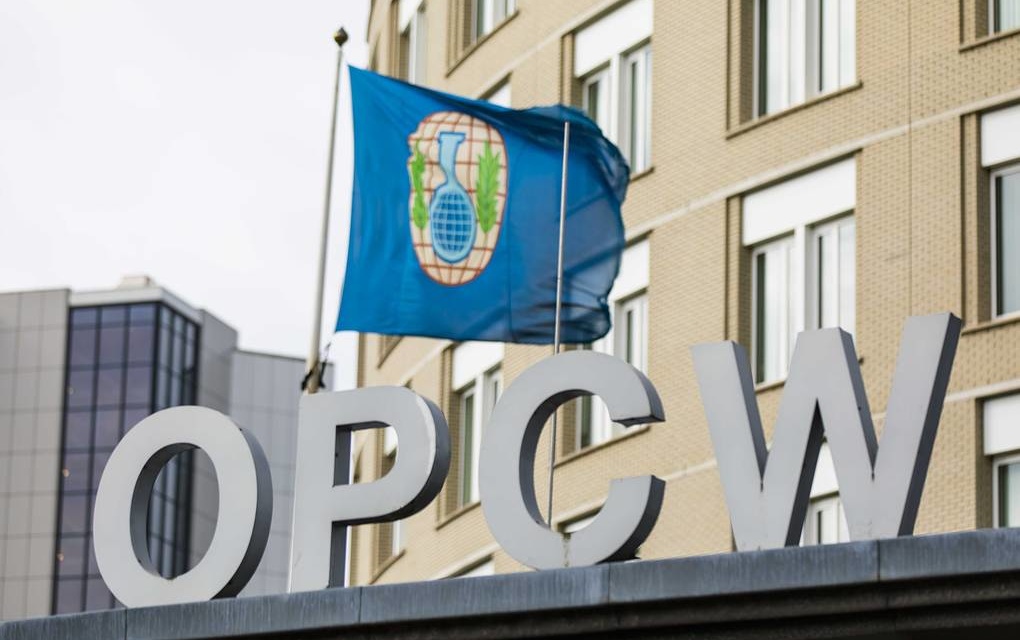Russia has failed in its latest attempt to block inspections of chemical attacks in Syria.
Other member-states of the Organization for the Prohibition of Chemical Weapons rallied behind the inspectors on Thursday, rejecting Moscow’s motion to cut funding for the Investigations and Identification Team.
In a vote on next year’s budget, 106 OPCW member states were in favor against only 19 who objected.
The IIT was established by the OPCW members in June 2018, over the objections of Russia and Syria’s Assad regime. It has the authority to assign blame for chemical attacks which have been confirmed by the OPCW’s Fact Finding Mission.
The ITT is currently considering seven attacks, including the chlorine assault at Douma near Damascus which killed 43 people in April 2018. OPCW Director General Feranando Arias says the team will complete its first reports in “a few months”.
In November 2017, Russia was able to end the IIT’s predecessor, the Joint Investigations Mechanism, through a veto in the UN Security Council. Moscow acted after the inspectors concluded that the Assad regime was responsible for a sarin attack on Khan Sheikhoun in northwest Syria in April 2017, killing about 90 people and wounding hundreds.
But with the authorization of the IIT by the Conference of State Parties, the Russians have again tried to shield the Assad regime with the insistence that the OPCW is politicized and acting for Western states.
In recent months, Moscow has backed a network of bloggers, activists, and some academic and journalists tarnishing the investigation of the Douma attack.
Despite the pressure, the OPCW’s Fact Finding Mission reported in March that there were “reasonable grounds” to conclude that chlorine had been released in a building where the 43 victims were killed. Russia immediately sought to undermine the report, and supportive activists have tried to use the dissent of two OPCW personnel to insist that the inspections are illegitimate.
Denying Syria’s Chemical Attacks, Attacking the Inspectors — The Douma Case
Increased Backing for OPCW
The 106 member-states who approved the OPCW budget was an increase on last year’s vote of 99-27 in favor.
Moscow’s delegate Alexander Shulkin complained, “Russia would like to express our deepest regret. Once again we find ourselves in a situation where a number of state parties chose not to take into account the opinion of the Russian Federation and a number of other major contributors.”
The Assad regime said it “rejected the political blackmail by the United States and its western allies”.
But other states were vocal in support after Director General Arias opened the conference with full backing of the inspection teams and their “independent, professional conclusions”.
The British delegation wrote, in a message retweeted and echoed by colleagues such as Canada and The Netherlands:
OPCW 2020 budget passed by significant majority. A clear signal of support for the organisation & its essential work, including in tackling impunity for cw use. #CSP24
— UK Delegation OPCW (@UK_OPCW) November 28, 2019
France’s Tiphane Jouffroy rebuffed the Russian propaganda campaign, “We regret that some delegations have given more importance to partial leaks than to a report which was generated in a rigorous manner.”
And US delegate Kenneth Ward chided Moscow:
The Syrian cover-up is never going to work because the international community has the courage of its convictions. Unfortunately Russia has played a central role in this cover-up.
On Tuesday, Russian Foreign Minister Sergey Lavrov had railed about “the dishonesty of many experts in this organization”, using unsupported conspiracy theories to allege that White Helmets rescuers had staged the chemical attacks.
The OPCW was authorized to work in Syria after the Assad regime’s 2013 sarin attacks near Damascus that killed at least 1,400 people. Since then, UN and OPCW inspectors have found the regime culpable for 33 chlorine and sarin assaults.

